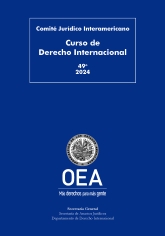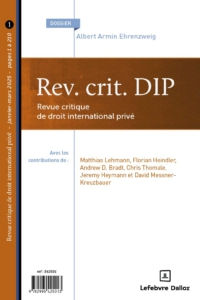Views
Disentangling Legal Knots: Intersection of Foreign Law and English Law in Overseas Marriages
Written by Muhammad Zubair Abbasi, Lecturer at School of Law, Oxford Brookes University (mabbasi@brookes.ac.uk)
Introduction:
In a recent judgment Tousi v Gaydukova [2024] EWCA Civ 203, the Court of Appeal dealt with the issue of the relevance of foreign law to the remedy available under English law in respect of an overseas ceremony of marriage. Earlier the High Court had held that the foreign law determines not only the validity or invalidity of the ceremony of marriage but also the ramifications of the validity or invalidity of the ceremony. The Court of Appeal disagreed and reiterated the rule that lex loci celebrationis is limited to the determination of the validity or invalidity of the ceremony of marriage. Therefore, English law will apply to provide a remedy or relief upon the breakdown of the relationship of the parties to a marriage ceremony that took place abroad.
Egyptian Supreme Court on the Enforcement of Foreign Judgments – Special Focus on the Service Requirement
I . Introduction
Egypt and its legal system occupy a unique position within the MENA region. Egyptian law and scholarship exert a significant influence on many countries in the region. Scholars, lawyers, and judges from Egypt are actively involved in teaching and practicing law in many countries in the region, particularly in the Gulf States. Consequently, it is no exaggeration to say that developments in Egyptian law are likely to have a profound impact on neighboring countries and beyond, and warrant special attention. Read more
International Jurisdiction between Nationality and Domicile in Tunisian Private International Law – Has the Perennial Debate Finally been Resolved?
I would like to thank Prof. Lotfi Chedly for providing me with the text of the decision on which this post is based.
I. Introduction
Scholars of private international law are well familiar with the classic debate on nationality and domicile as connecting factors in the choice of applicable law (see, for example, L. I. de Winter, “Nationality or Domicile? The Present State of Affairs” 128 Collected Courses III (1969) pp. 357 ff). In Tunisian private international law, this controversy has been particularly pronounced with regard to the role of nationality as a ground for the international jurisdiction of Tunisian courts. Since the enactment of the Tunisian Private International Law Code (“PILC”) in 1998 (for an English translation, see J. Basedow et al. (eds.) Encyclopedia of Private International Law – Vol. IV (Elgar Editions, 2017) 3895 and my own translation of the provisions dealing with international jurisdiction and the enforcement of foreign judgments in 8 Journal of Private International Law 2 (2012) pp. 221 ff)), the debate between opponents and proponents of nationality as a ground for international jurisdiction, especially in family law matters, has never ceased to be intense (for detailed analyses, see eg. Salma Triki, “La compétence internationale tunisienne et le critère de nationalité” in Ben Achour/Triki (eds.), Le Code de droit international privé – Vingt ans d’application (1998-2018) (Latrach edition, 2020) 119ff). This divergence in academic opinion is also reflected in the judicial practice of the courts, with the emergence of two opposing trends: one extends the international jurisdiction of the Tunisian courts when the dispute involves a Tunisian party, in particular as a defendant even when domiciled abroad. The other firmly rejects nationality as a ground for international jurisdiction.
News
Out Now: The 50th anniversary of the first Inter-American specialized conference on private international law. The future of private international law in the Americas by Dante Mauricio Negro Alvarado

The Department of International Law (Secretariat for Legal Affairs) of the Organization of American States (OAS) has just published in essay form the lectures delivered during the 49th Course on International Law, which was held on 5 -16 August 2024. For more information, click here.
The book features the following piece: The 50th anniversary of the first Inter-American specialized conference on private international law. The future of private international law in the Americas by Dante Mauricio Negro Alvarado (in English, p. 295-335). This is a must-read for Private International Law academics and lawyers from the region and beyond. Read more
Call for Abstracts – Emerging Voices in Private International Law (Asser Institute)
Post prepared by Eduardo Silva de Freitas, PhD researcher Erasmus University Rotterdam and junior researcher at the Asser Institute
As part of its 60th anniversary celebrations, the T.M.C. Asser Institute invites abstracts for the panel “Emerging Voices in Private International Law”, to be held on 24 October 2025 in The Hague, at the conference Adapting Private International Law in an Era of Uncertainty.
The panel will feature two early-career scholars (PhD candidates or postdoctoral researchers) presenting original work in the field. Selected participants will also contribute to a forthcoming volume in the Short Studies in Private International Law series.
To apply, please submit a 400-word abstract and brief personal details by 15 August 2025 (24:00 CET) to: e.silva.de.freitas@asser.nl
Full call for abstracts: https://www.asser.nl/media/797989/call-for-abstracts_pil_asser.pdf
Revue Critique de droit international privé – issue 2025/1
 Written by Hadrien Pauchard (assistant researcher and doctoral student at Sciences Po Law School)
Written by Hadrien Pauchard (assistant researcher and doctoral student at Sciences Po Law School)
The first issue of the Revue Critique de droit international privé of 2025 has just been released. It gathers six contributions honouring Albert Armin Ehrenzweig and his legacy, as well as seven case notes and numerous book reviews.
The doctrinal part of the volume is devoted to the proceedings of the Albert Armin Ehrenzweig Conference organized in June 2024 at the University of Vienna, fifty years after the passing away of the great author. The contributions commemorate both the man and the scientist, testifying to the relevance of Albert A. Ehrenzweig’s scholarship to contemporary private international law. They are published in French in the printed version of the Revue (also available online here), and will be available shortly in English (here).


